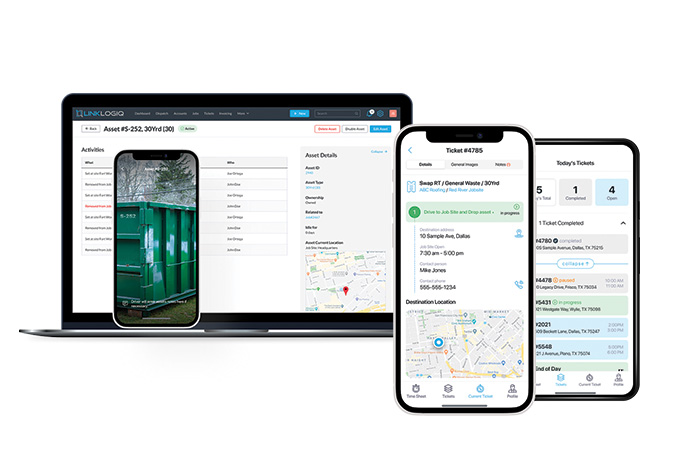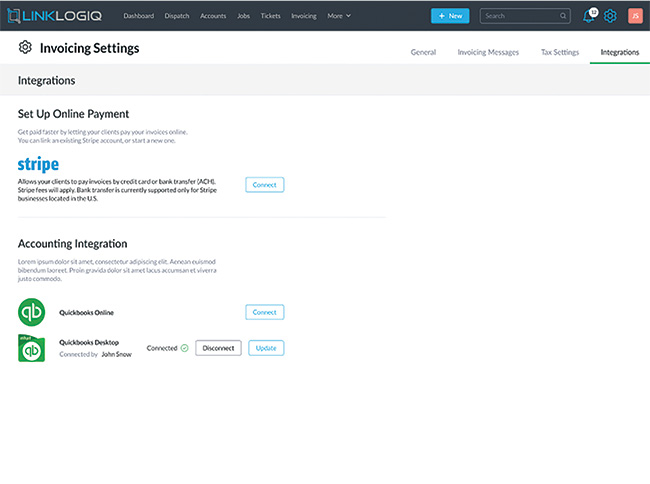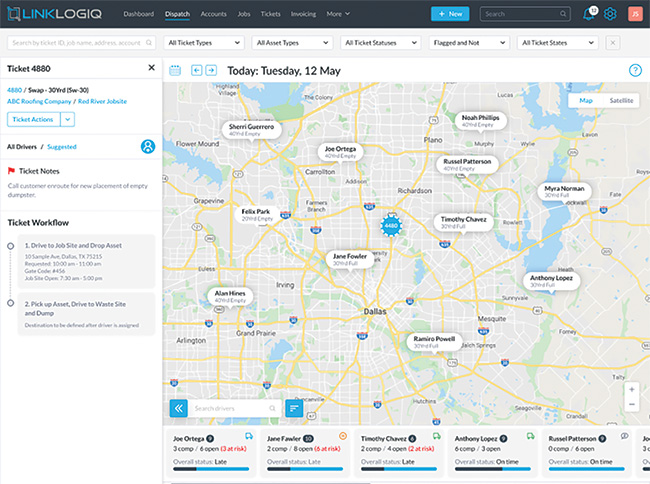Integrating an operational management platform is not just an upgrade, it is a strategic investment.
By Jessica Gwin
Transforming the way businesses handle and optimize their operations, cutting-edge platforms provide a comprehensive, cloud-based solution specifically crafted for the waste management sector. It offers an array of functionalities that include efficient dispatching, meticulous accounting, and precise asset tracking. Real-time dispatch systems are notable features, enabling businesses to track and manage driver locations, ticket statuses, and workloads on the fly, thereby enhancing operational responsiveness and agility.
Enhancing Communication Efficiency and Quality
Operational management solutions offer an extensive array of features aimed at overseeing, regulating, and enhancing the performance of operations. These tools, incorporating advanced GPS tracking capabilities, sophisticated route optimization algorithms, and seamless real-time communication channels, furnish managers with a detailed and real-time panorama of activities. This comprehensive visibility empowers managers to make prompt and well-informed decisions, significantly improving operational outcomes.
Central to these advancements is the ability to refine communication processes via centralized platforms, effectively eradicating the inefficiencies and delays that are often endemic to conventional communication techniques. By consolidating communications, these platforms ensure that information flows smoothly and efficiently between all relevant parties, facilitating a more synchronized operation.
The integration of cutting-edge solutions is a pivotal step toward achieving unparalleled operational efficiency. Businesses that leverage these tools can anticipate substantial benefits, including a reduction in fuel consumption, which speaks directly to cost savings and environmental stewardship. Additionally, the implementation of optimal route planning not only enhances efficiency, but also contributes to customer satisfaction by ensuring timely pickup and delivery. Furthermore, the enhanced coordination among team members, facilitated by these tools, fosters a more collaborative and effective work environment.

Right: Driver’s App: elevating productivity to new heights.
Images courtesy of LinkLogiq.com.
The Importance of Tracking Your Assets
The practice of asset tracking is fundamental, offering a multifaceted approach to monitoring that transcends simply pinpointing the whereabouts of your assets. This essential process involves the vigilant tracking of a wide array of assets, including the equipment used, the cargo being transported, and the personnel on the move. The ramifications of neglecting to implement a comprehensive asset tracking system are substantial and can severely impact a business’s operations. These consequences range from the misplacement or loss of valuable assets, a noticeable dip in productivity levels, to the alarming compromise of security measures.
The essence of a robust asset tracking system lies in its capacity to provide a business with unparalleled visibility and control over its entire fleet of assets. This visibility is not limited to real-time location tracking; it extends to monitoring the condition of assets, ensuring compliance with maintenance schedules, and optimizing the use of resources. Such a system empowers businesses to prevent asset theft, mitigate losses, and enhance the efficiency of asset deployment, thereby ensuring that every asset is in the right place at the right time and in optimal working conditions.
Moreover, a well-integrated asset-tracking system is vital for strategic decision-making. It enables businesses to gather and analyze data on asset usage, performance metrics, and operational bottlenecks. This data-driven approach facilitates informed decisions that can lead to significant cost savings, improved service delivery, and enhanced operational agility.
Why Intuitive Dispatching is Critical
Intuitive dispatching transcends traditional dispatch systems by providing dynamic, real-time insights into operational logistics. This real-time data access on both PC and mobile devices allows for unprecedented flexibility and control, empowering dispatchers to make informed decisions instantaneously. The ability to assign and unassign tickets on the fly, regardless of the dispatcher’s or driver’s location, is not just about improving efficiency, it is also about transforming the way logistics companies operate.
Operational Efficiency and Cost Reduction
One of the most compelling benefits of intuitive dispatching is the significant boost in operational efficiency it offers. By having a comprehensive overview of the entire fleet in real-time, dispatchers can optimize routes, reduce idle times, and ensure that urgent deliveries are prioritized, all of which contribute to a reduction in operational costs. This efficiency is not only reflected in fuel savings and reduced wear and tear on vehicles, but also in enhanced customer satisfaction through timely deliveries and minimized service disruptions.

Enhanced Flexibility and Scalability
In the face of fluctuating demand and unexpected challenges—such as traffic delays or urgent last-minute orders—intuitive dispatching provides the flexibility to adapt quickly. This adaptability is crucial for maintaining service quality and meeting customers’ expectations in a landscape where they are higher than ever. Moreover, as businesses grow, the scalability offered ensures that expanding operational demands are seamlessly managed without the need for proportionally increasing the workforce.
A Competitive Edge in Customer Service
Today’s customers expect not just fast, but also reliable and transparent service. Intuitive dispatching meets these expectations head-on by improving delivery times and providing real-time updates to customers. This level of service is a significant competitive advantage, fostering customer loyalty and enhancing the company’s reputation in the market.

A Driver’s App and Customer App: Vital Components
A Driver’s App and Customer App are integral components of an operational management solution, serving distinct yet equally vital roles in enhancing operational efficiency and customer satisfaction. A Driver’s App empowers drivers with real-time access to essential information, enabling efficient task management, route optimization, and effective communication with dispatchers and customers. By providing detailed instructions and route guidance, the app minimizes delays and ensures timely deliveries. Its GPS technology allows drivers to navigate through traffic congestion, enhancing overall productivity. Moreover, the app facilitates seamless communication, enabling instant updates on an order status and any challenges encountered on the road. This transparency and efficiency not only improves driver performance, but also enhances customer satisfaction.
Conversely, a Customer App offers clients unparalleled visibility into their orders, providing real-time updates on shipment tracking and estimated delivery times. It fosters trust and confidence by empowering customers to monitor their logistics effectively. Additionally, the app facilitates feedback and ratings, driving continuous improvement and ensuring operational excellence. Together, these types of apps optimize operations, enhance transparency, and deliver exceptional service.
Enhancing Logistics Efficiency: Invoicing, Online Payments, Flexible Pricing, and Customized Reporting
In today’s dynamic business environment, efficient logistics management is paramount to success. The operational platform should place emphasis on invoicing and online payments, flexible pricing structures, and customized reporting in order to underscore its commitment to meeting the diverse needs of businesses operating in the logistics sector.
At the core of a logistics management system is a robust invoicing and online payment system. By facilitating seamless transactions, this can streamline the financial aspect of logistics operations, reducing administrative burdens and minimizing payment processing times. This not only enhances operational efficiency, but also fosters trust and reliability among stakeholders, ultimately contributing to smoother business transactions.
Furthermore, a flexible pricing structure should be tailored to accommodate the unique requirements of each client. Whether it is volume-based pricing, tiered pricing models, or customized contracts, a platform should offer a range of options to suit diverse business needs. This flexibility not only ensures cost-effectiveness, but also enables businesses to adapt to changing market conditions and scale their operations accordingly.
Equally important is the platform’s provision of customized reporting capabilities. By offering insights tailored to specific metrics and key performance indicators (KPIs), a management system empowers businesses to make informed decisions and drive continuous improvement. Whether it is analyzing delivery performance, optimizing routes, or identifying cost-saving opportunities, customizable reports provide invaluable insights that drive operational excellence.
A Strategic Investment
Integrating an operational management platform is not just an upgrade, it is a strategic investment. With improved efficiency, communication, and asset tracking, these tools pave the way for operational excellence. The time to invest is now.| WA
Jessica Gwin is a dynamic marketing professional dedicated to driving growth and visibility for Linklogiq. With a passion for innovation and a keen understanding of market trends, Jessica plays a pivotal role in shaping the company’s brand image and expanding its reach within the waste management industry. Linklogiq is a leading solution, redefining the tools needed with innovative, technology-driven approaches. Catering specifically to the demands of the waste management industry, Linklogiq offers an inclusive suite that streamlines dispatching, asset tracking, and financial integration. Its seamless incorporation of real-time data and user-friendly interface positions Linklogiq at the forefront of enhancing operational efficiency and customer satisfaction in a sector where precision and reliability are paramount. Jessica can be reached at (877) 480-5465, e-mail [email protected] or visit Linklogiq.com.
